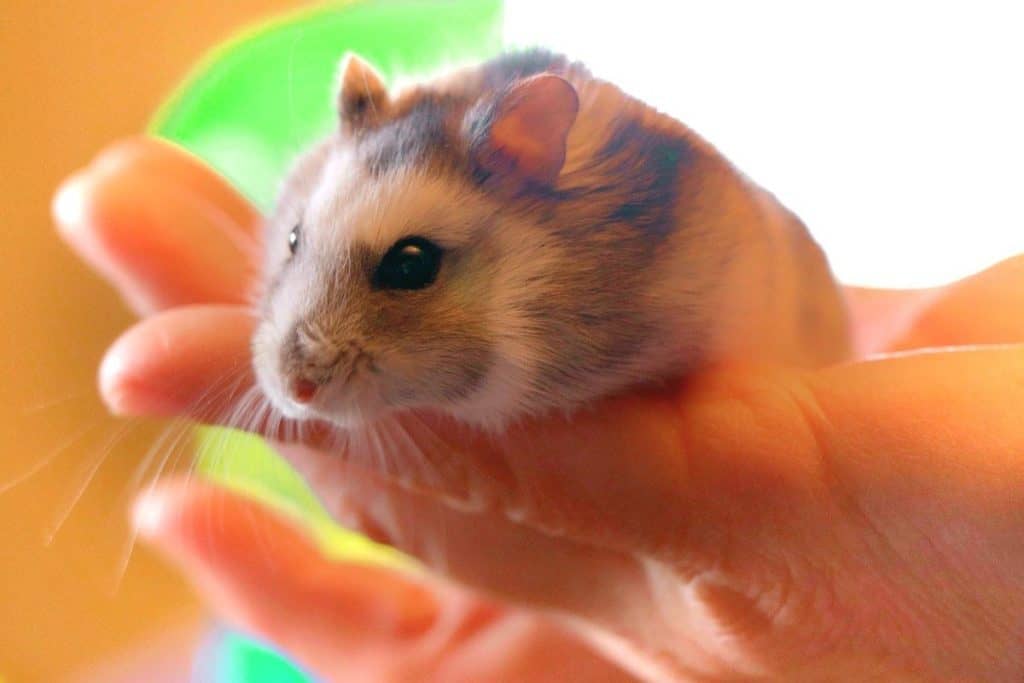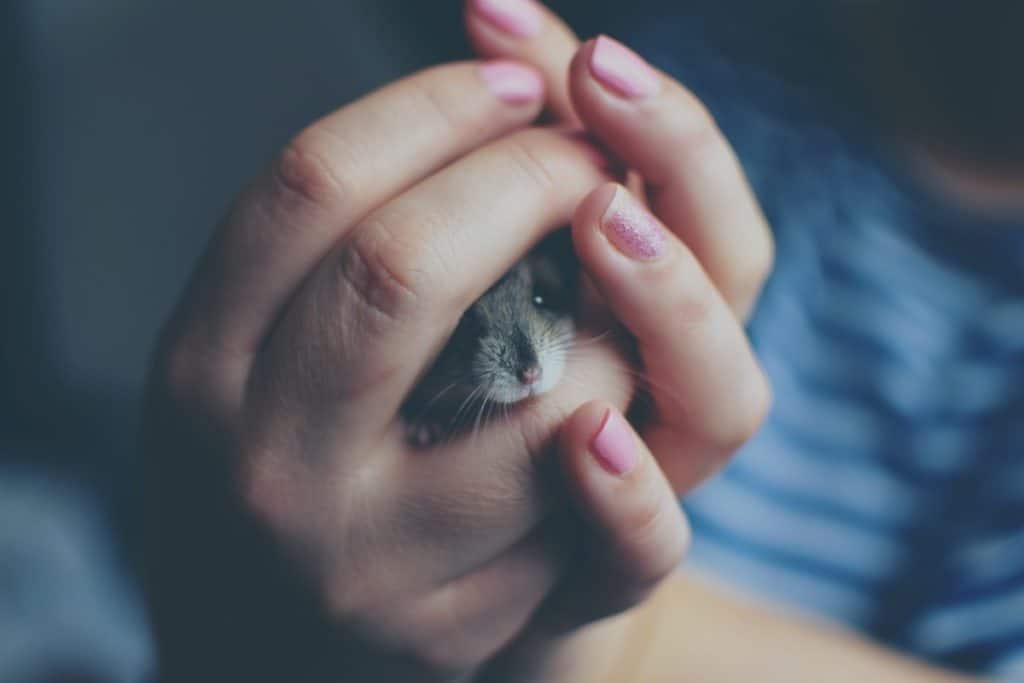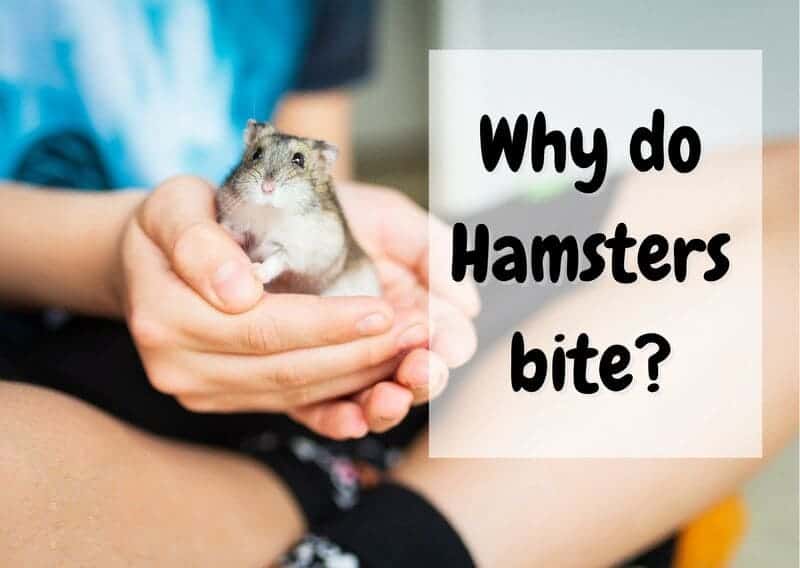When handling their hamster, many pet owners ask “Why did my hamster just bite me?” The truth is, hamsters may bite for several reasons. To make them not bite or nip at you just takes some taming and a little patience. In this article, you will find out the 4 main reasons why hamsters sometimes bite their owners, and 5 practical steps to tame your hamster not to bite.
Why Does My Hamster Bite Me?
On the outside of their cute appearance, hamsters look as if they are friendly right from the start. But like most rodents, they are startled easily and will react in all kinds of ways. One method they use as their only defense is to bite whatever appears to be a threat to them.
So why do hamsters bite in the first place? There are 4 main reasons why this might happen:
- Nervousness or excitement
- The smell on your hands
- Noisy surroundings
- Lack of training
1. Nervous or excited
The first reason why hamsters might bite is simply that they become startled by your presence. If you run into their room this can catch them off-guard and they get nervous or scared as a result. If you try to get your hand into their cage immediately, they will react in a hostile way by biting you.
This is more common with little kids that do this and end up getting bitten by a nervous hamster. It’s always a good idea to always make nice and slow movements and act calmly around your hamster. Even raising your voice can make your hamster skittish.
2. The smell on your hands
Another common reason for a hamster to bite is that they smell something on your hands. You have to keep your hands very clean so they don’t bite you by accident. If you smell like food, they will be tempted to test that out by biting you.
3. Noisy surroundings
Keeping animals in the same room will be a good way to get bitten if they get spooked by your other pet. If your dog is barking while you are holding a hamster, this can lead to being bitten, or worse as they try to escape.
4. Lack of training
Hamsters are also a powder keg waiting to go off if you don’t tame them early enough. When you first buy a hamster and bring them home, you will need to give them time to adjust to its new habitat.
They will be nervous if you brought them home during their sleeping cycle. The best thing you can do is let them get some sleep until they naturally wake up at night. This is when you can start the introduction process, which we will be talking about next.
How To Tame a Hamster To Stop Biting – Step by Step

When you start caring for your hamster, the breaking-in period often takes 5 weeks in all. Each week is a new introduction to the steps you teach them. Here are the complete steps you should follow each week until they learn through repetition.
1. Week one: Hanging around time
Bringing your hamster home for the first time is going to be a new experience for you and your pet. Let them become adjusted to their new habitat but on their terms. You need to let them become relaxed in their cage, and sitting next to them will get them used to your presence.
They will start to recognize your scent and they will become used to you hanging around. They will learn you are not an immediate threat, especially if you talk to them softly. When you clean their cage each week, it’s best to take off the lid in a bathtub so they don’t escape.
2. Week two: Lend a hand
Let your hamster know you are a friend by offering your hand from time to time. Put your hand on their cage slowly on the top or on the sides. This way they see that your approaching hand is not an immediate threat to them.
After two or three days, you can slowly start to open the cage door and enter your hand. Don’t be surprised if they try to bite you, it does take several attempts for them to be relaxed with this. After this, they might start to approach you sniffing you out and being curious.
3. Week three: Be generous with treats
Once a hamster is used to your hand being in the cage you can put some food or a small treat on your palm. This teaches them to step onto your hand and after that, you can try handing a snack to them with your other hand. If they readily accept snacks without fleeing this means they are comfortable with you.
If you see them eating a snack on your hand they are now familiar with you and your presence. This should be repeated often and they will always repeat this to get a new snack. If your hamster is showing they are content with sitting in your hand, the next step will be easier to do.
4. Week four: Start to touch them
As a hamster is eating their snack you can slowly use a finger to stroke its back. They might be skittish at first but will see this is no harm to them. It will take several attempts to get your approach right and not get nipped in the process.
By the end of this week, they will be familiar with your petting and allow you to touch them. They might even start to show their trust by enjoying these sessions – as long as you have the treat to distract them.
5. Week five: Pick-up tricks
By now your hamster is used to being in your hands and it will be time to let them wander from hand to hand. You need to cup your hands so they don’t fall out while you practice picking them up from their cage. Try sitting so they don’t fall very far if your hamster jumps out of your palm.
Once they are learning to wander from hand to hand, reward them with a tiny snack when they repeat this more often. They will be curious and start searching for a snack if you don’t have one, so always reward good behavior. This is when you have gained enough trust to pet them and hold your hamster in your hand without the risk of getting bitten.
How often do hamsters bite?
How often a hamster will bite depends on how and how often you handle them. They might try to bite you if you insist on picking them up or handle them when they are not up for it. You have to earn their trust first and this will take time by doing things they won’t feel threatened with. If they try to bite or nip at you, they are just not ready for that yet.
How strong is a hamster bite?
Baby hamsters are probably going to be tiny when you get them, so their teeth are very tiny too. If you do get bitten it won’t feel like you’ve been bitten at all, but rather like they are chewing on you. Most of the time, you won’t notice you have been bitten until you see blood.
A full-grown Syrian hamster bite can be quite painful if you spook them and it will feel like a sharp pinch. But surviving a bite from a little hamster is no big deal and the shock of the bite itself is what most people are fearful of.
What to do (and what not to do) if a hamster bites you

If a hamster bites you, you probably won’t feel much more than a little clamp-like pinch. If they hold onto your skin you might have the instinct to pull back, but this can result in a bite that is larger because the skin is torn open.
Wash your bite with cold water for several minutes and rinse out the wound itself. If you can squeeze the skin softly you can expel any bacteria that would be in their mouth. You can treat the wound with alcohol and hydrogen peroxide followed by a band-aid.
If you pull back too abruptly this might cause your hamster to get yanked away and get badly hurt from being launched through the air and across the room. The best move is to slowly detach the hamster from your skin and put them back in its cage.
Is a hamster bite dangerous?
There is no immediate danger of getting serious illnesses from a hamster. They don’t carry rabies or other sicknesses that can be passed onto you. In the worst-case scenario, if they do bite you, the risk of infection is the problem.
Treat your wound with 99% rubbing alcohol and Hydrogen peroxide. If you see any kind of redness after a couple of days you will need to use an antibacterial ointment to kill left-over bacteria. Even though they are tiny, hamsters have long teeth that can make deep puncture wounds.
Are hamsters aggressive by nature?
Hamsters are not aggressive but they have their limits. If they feel threatened by anything they can easily become agitated and try to attack and defend themselves. They can become aggressive with other hamsters inside their cage and Syrian hamsters especially are territorial.
Golden hamsters and Syrian breeds need to be caged as a single pet and will not tolerate another Syrian unless it’s for breeding purposes. Smaller dwarf hamsters will love the company of little buddies, but there can be squabbles from time to time. If two hamsters are fighting they need to be separated into another cage.
In the beginning, it’s more common for a new hamster to be aggressive but this will be short-lived. As they get to know you, they will become less prone to showing signs of aggression. Introducing a new hamster that is younger is a delicate process too since older hamsters will boss the newbies around.
Do hamsters actually like to be held?
Once you tame a hamster, it’s content with being in your hands. Perhaps it’s the treats that you give them or the curiosity that drives them or their trust in you. They will be happy being held if they know there is a treat involved at some point. They might even start showing some affection while you hold them against you.
When not to hold a hamster
They will have days where you just should not try holding them so don’t press the issue. If they have had a fight with another hamster, you need to let them cool down and relax.
Angry hamsters are unpredictable, so don’t risk getting bitten because you believe you have tamed them already. Just let them be for a while and try approaching them later when they calm down.
Do hamsters bite more than gerbils and guinea pigs?
Gerbils and Guinea pigs bite nearly as much as a hamster if they have good enough reason to do so. If they feel threatened, these little animals will bite if they are uncomfortable with something.
The problems of biting and aggression are the traits of other relatives that are within the rodent family. When it comes to aggression, they can’t change their built-in defenses toward others. But when it comes to their owners, they learn through taming and lots of patience.
Why does my hamster bite its cage?
If you see a hamster biting the bars on its cage, it’s most likely from boredom. It can also be part of a bigger problem that your hamster is trying to express. This is often from stress and feeling that their cage is simply too small.
You will need to put your hamster into a larger cage so they don’t stress so much anymore. They will enjoy being in a larger habitat and no longer chew on the cage bars after that.
Resources and further reading:
- Tularemia associated with a hamster bite – Colorado, 2004, Centers for Disease Control and Prevention
Contents
- Why Does My Hamster Bite Me?
- How To Tame a Hamster To Stop Biting – Step by Step
- How often do hamsters bite?
- How strong is a hamster bite?
- What to do (and what not to do) if a hamster bites you
- Is a hamster bite dangerous?
- Are hamsters aggressive by nature?
- Do hamsters actually like to be held?
- Do hamsters bite more than gerbils and guinea pigs?
- Why does my hamster bite its cage?













